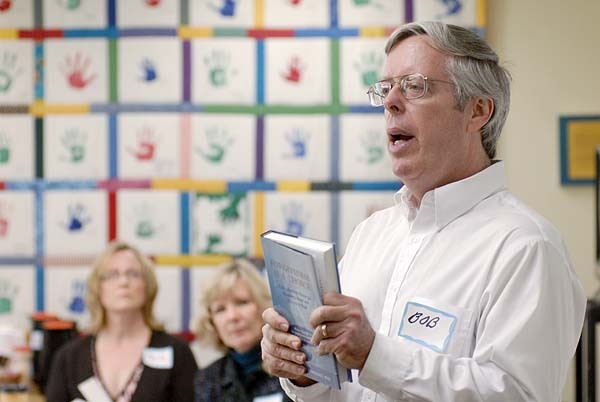Forgiveness perfect gift for the holidays

Robert Enright leads a workshop in Milwaukee for parents, teachers and social-service professionals on a comprehensive curriculum for introducing children to the idea of forgiveness.
If you want your holidays to be happier, Professor Robert Enright suggests giving the gift of forgiveness. While it is helpful any time of the year, it can be especially welcome during the holidays.
“All the past pains can come tumbling down during the holidays,” Enright says. “It’s not just a time for being with family but for reflecting back. It can be very painful.”
Enright, a professor of educational psychology, has pioneered the scientific study of forgiveness, which now claims more than 1,000 researchers worldwide. He has spent more than 25 years researching the power of forgiveness and letting go of anger.
Staying angry at those we feel have wronged us is often a defense mechanism, Enright says.
“In the short run, it’s a Band-Aid for a festering sore,” Enright says.
“[The holidays are] not just a time for being with family but for reflecting back. It can be very painful.”
Robert Enright
But if anger can offer a sense of short-term protection, why should we consider forgiveness? Enright’s research has shown that it can reduce depression and anxiety and has also helped cardiac patients have better functioning hearts.
“Simply put, forgiveness is good for you,” Enright says.
Enright’s research has shown that children in contentious regions of the world, such as Northern Ireland and Liberia, reduce their amount of anger and depression as a result of one-hour-per week classroom instruction on forgiveness. He’s also interested in encouraging forgiveness as part of everyday life — not just when something unspeakable occurs.
Enright describes forgiveness as a journey — something that doesn’t necessarily magically appear.
One of the first steps in forgiveness is uncovering the anger. Contemplate how you’ve dealt with it and how anger has affected your health and relationships, Enright suggests.
“When you realize there is something called forgiveness, you can get rid of most of the pain,” Enright says.
The next step is deciding to forgive. That doesn’t mean you are OK with what has been done, Enright says, but rather that you acknowledge that how you’ve handled the hurt hasn’t worked.
During the holidays, people who otherwise avoid each other can be thrown together in family or social situations that force the issue.
Step three is to work on forgiving. While that can be a challenge, you will be more successful if you work toward understanding and compassion, Enright says.
“You have to begin seeing each other as a person, not because of what they’ve done but in spite of it,” Enright says.
The final step is discovery and release from “emotional prison.” It may sound painful, but Enright says there’s a true freedom in forgiveness, not only for the person being forgiven but for the person doing the forgiving.
He has seen what a gift forgiveness has been for everyone ranging from those with small friendship squabbles to survivors of incest.
“Forgiveness is having mercy on those who have not had mercy on us,” Enright says.
And sometimes you have to ask others for forgiveness. During the holidays, people who otherwise avoid each other can be thrown together in family or social situations that force the issue. It can be painful to ask for forgiveness and risk rejection, Enright realizes, but it’s something we sometimes have to accept.
“A lot of times we have to realize in giving or asking for forgiveness that we’ve done our best,” Enright says. “Our happiness isn’t contained in others’ responses. At least we’ve done the asking or the offering. Knowing that, we can go in peace to a certain degree.”
Tags: holidays, psychology, School of Education



